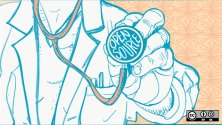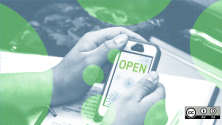Department of Health and Human Services (HHS) Entrepreneur-in-Residence, Todd Park joined us on July 7 to talk about the power of open data for improving health. His position with HHS was created by the Obama administration as a change agent. And he's taking that role seriously.
Todd is passionate about improving health. To prove it, he's taken the culture of HHS toward one of data liberation, of openness, and of government 2.0. He wants everyone to understand how open data can be harnessed to improve the health of the country. Taking a page out of the Tim O'Reilly playbook, Todd has set up a public and private collaboration where government serves as a platform for open data and the community of individuals and companies are the creators.
Park gave an overview of the Health Data Initiative, which he describes as "a major campaign by the Department of HHS to unleash the power of open data and open innovation to improve health and healthcare in America." The ultimate goal is to bring agencies together to create the "NOAA of health data." For decades, NOAA has made freely available the volumes of weather data it collects, and this raw data has led to vast private sector innovation. Similarly, when GPS data was opened up, services from navigation systems to GPS on your mobile phone became possible. In the same way, HHS hopes that the Health Data Initiative will do the same--fuel massive innovation by stimulating private innovation with open data.
The plan involves three steps:
- Publish new HHS data for public access while protecting privacy and confidentiality
- Make the existing data easily accessible and machine-readable, i.e., available through APIs
- Publicize the data and its availability to innovators who can use it as the raw material to improve healthcare
Types of data
Park offered several categories and examples of the types of data being liberated, including:
- Community health data: National, state, and even county-level information, such as smoking rates, access to healthy food, hospital data. At healthindicators.gov, they published in February 1,170 metrics of community health and healthcare performance.
- Provider directories and quality: Information about care providers, from free and low-cost care to elder care services, and others across the spectrum. This information includes quality of care and patient satisfaction data about nursing homes, hospitals, and home health care. Beginning in Jan 2012, Medicare claim files will be available for provider quality measurement to any private or public entity that is qualified to handle the data.
- Medical and scientific knowledge: The National Library of Medicine was one of the early contributors to open data. Last September they released an API portal for access to many tools like ClinicalTrials.gov and Pillbox APIs, which gives you detailed information about solid medication and has recently added high-resolution photos of them.
- Government spending: Medicare claims as "basic standalone files" are now available for the first time as of May 2011. They are largely redacted for privacy reasons but are freely available to anyone for all major types of care, including information on patterns of healthcare and health in files separated by type of care: hospital, drugs, and so on.
For more on all of these as well as the other types of data that have been released, visit the one-stop site HHS created at healthdata.gov, which also has a form to ask questions about the data. An Apps Expo on the site shows uses for the data.
Creating innovation and jobs
Park called the ultimate goal of the initiative "to catalyze the development of . . . a self-propelled, decentralized open ecosystem of innovators that actually draw up on the data using it as fuel to put together amazing products and services that improve healthcare and create jobs at the same time." These products and services should help:
- Consumers take control of their health
- Employers promote health and wellness
- Care providers deliver better care
- Journalists shed a light on healthcare
- Local leaders make better-informed decisions on healthcare
"There's no one who is in charge," Park said. "It's actually a decentralized, open, self-propelled ecosystem that is 10,000 flowers blooming that outperforms by orders of magnitude what any ten organizations could do." As a recent exhibit of this, he offered the June 9 "health datapalooza." After a general call for innovations that have been built and deployed, they showcased nearly 50 of them selected via an online audition process after an overwhelming response of qualified entries. (We wrote about one of these, Ozioma, which also won the Health 2.0 and National Cancer Institute Developer Challenge.)
"There's never been a better moment to be a healthcare innovator than right now," Park said. In his equation representing this historic time, new incentives plus information liberation equal "rocket fuel for innovation."
"I've met hundreds of innovators in the last six months who are doing ridiculously awesome stuff," he said. "It's going to hit [public consciousness] in waves pretty soon, and it gives me every confidence that as long as we follow through on the incentive change to reward health and quality and on information liberation, American innovators will take care of the rest. And America will absolutely invent its way out of the healthcare problem."
Recording
A recording of the webcast as an ogg is available below as an attachment to this post.






Comments are closed.